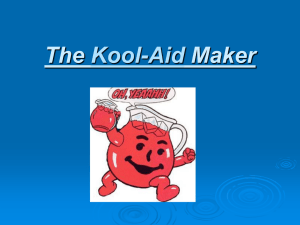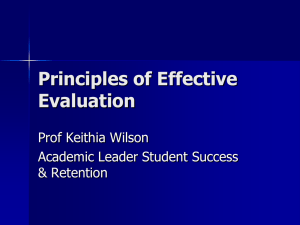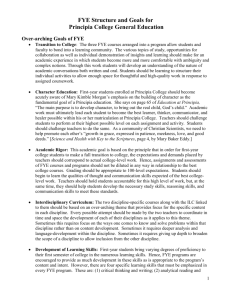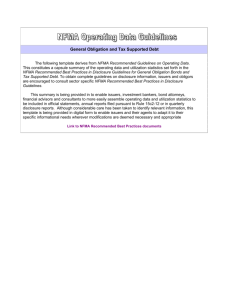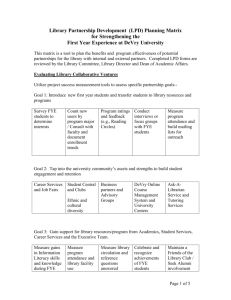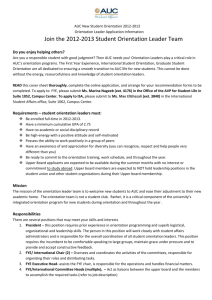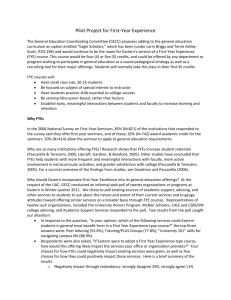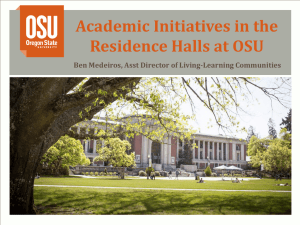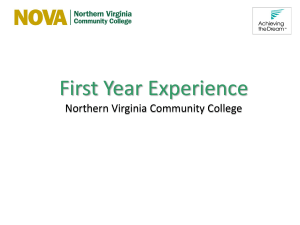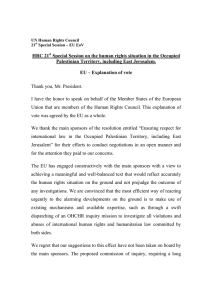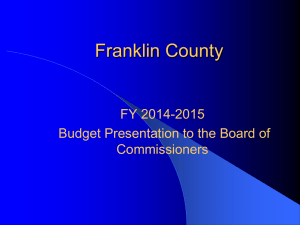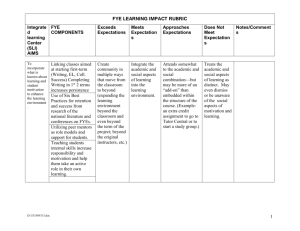VT PowerPoint Template2
advertisement
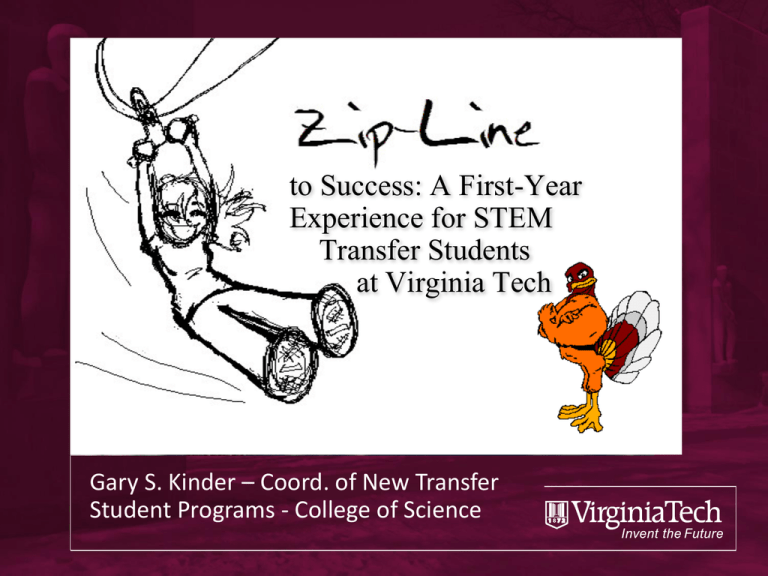
to Success: A First-Year Experience for STEM Transfer Students at Virginia Tech Gary S. Kinder – Coord. of New Transfer Student Programs - College of Science Man’s Best Friend… How many uses can you come up with for it? 2 Some “Framing”… • The Beloit “Mindset List: 2014”: • Since “digital” has always been in the cultural DNA, they’ve never written in cursive and since cell phones tell time, there is no need for a wrist watch. The now are awash with computerized technology that will not distinguish between INFORMATION and KNOWLEDGE. A generation accustomed to instant access will need to acquire “the patience of scholarship”. 3 Some Up-front Misperceptions…. 1. Transfer students are better prepared for college coursework and university life than traditional freshmen. 2. Effective learner-centered pedagogies operate independently of the learning environment. 3. Today’s college students are digital natives. They can teach the faculty a thing or two about use of technology. Transfer Students in the College of Science at Virginia Tech Transfer Students in the College of Science at Virginia Tech Let’s Hear About YOUR Transfer Students Transfer students at my institution are: Transfer students at my institution need: Here in the South, we always fry Chicken with the Skin ON….... Once a “part” is gone, you don’t have it to use again….what will you do with it, once it makes its rounds to YOU ???????? 8 Along Came the QEP! Quality Enhancement Plan required as part of Virginia Tech’s reaffirmation of accreditation through SACS Within 5 years, all entering students at VT will receive a first-year experience (FYE) that addresses: Broader/universal learning outcomes (AAC&U VALUE rubrics) -Problem Solving -Inquiry (Information Literacy) -Integration …We proposed the Zip-line FYE for all transfer students in the College of Science AAC&U VALUE Rubrics VT-Modified Rubrics For Zip-line, we added additional learning outcomes: Teamwork and Community. 1. Contribute to team in and out of class. 2. Contribute to a constructive team climate. 3. Develop community identity and commitment. Assessment Tools 1. Reflection prompts in e-Portfolio: problem-solving, inquiry, integration, teamwork and community 2. Motivated Strategies for Learners Questionnaire (MLSQ): problem solving 3. Information Literacy Test (ILT): for inquiry 4. Open-ended questions given at end of course The QEP also mandated: 1. Training in and use of the new electronic course planner 2. Generation of an e-Portfolio by each student. 3. Incorporation of the VT Common Book In 3-person groups, at your tables, discuss : 1. What goals or outcomes are the most important for your respective transfer students? 2. What pedagogies and/or activities might be employed to accomplish these goals? What is SCALE-UP? SCALE-UP… Lessons Learned • Undergraduates can achieve “high” levels of learning through the SCALE-UP model • The broader learning outcomes are by no means “soft skills” and may require discipline specific training • Digital natives still need help in the appropriate use of technology • High achievers in traditional learning environments need specific attention- assumptions that “all will play nicely in the sandbox…” • Team skills need specific attention from the instructor • Don’t expect your teaching evaluations to improve in this setting! 18 Zip-line to Success – what did they do? • ~140 Transfer Students (COS) in 3 sections of ~45 students / 2-credit A-F course (Required) • Small-Groups/InterACTIVE Projects such as ePortfolio presentation on “Hot Button Topic Issues in Science” along with group paper; Library Subject Research Exercise; Research Opps and Grad. School in-class “look up” Exercises; Common Book Papers; Critical Thinking, Logic, Scientific Methodology Exercises; Strengths Finder Assessment- Resume/Career Fair & Interview Prep.; PreHealth and Pre-Med/Vet panel discussions in-class; Time and Money Management Seminars. • Group assignments foster group dynamics and interpersonal communications 19 Zip-line to Success – what did they do? • Group trips to local area attractions (Area farmer’s market, Appalachian Music events, hiking trails, State Parks, etc. • Visitor’s Center for regional information such as Medical, Restaurants, Retail Stores, Voter Registrar/other City/Town services/Utilities, Local/Part-time area Employment, etc. • Campus history and traditions • Used “Connections” Higher Ed. Textbook • Read campus/local papers (paper and on-line) • Start every class meeting with music and video clips (their choice and TAs) 20 Looks like a College Student, acts like a College Student, MUST BE a College student… “Misconceptions Realized”… • Technology usage - Scholar, Internet, PPT, PC vs. Mac, etc. • Academic preparation – Lacking in Critical Thinking Skills, Presentation skills and grasp of Group Dynamics • Students’ abilities to fully comprehend the merits of this type course (vs. “busy work”) -- Library, Grad. School, Research opps., VT Engage, Sustainability Paper, Self-Expression Project, etc. • Comprehension of Scientific Methodologies and Information/Research integrity/credibility---(“I found it on the Internet, so it HAS to be credible………right?”) 21 Lessons learned – changes for this year • Developed more science-relevant activities, focus on undergraduate research, career opportunities and graduate schools • Development of “What I Believe/ Passions, Interests, Skills” • Clarify grading rubric “I did all the work…where’s my A? !” • Further integration of “FYE Textbooks” – think about it…most textbooks are not designed for this format of class experience… • Additional training for students, in basic use of technology such as PPT (embedded videos, etc.), use of Macs, e-Portfolios as well as oral presentation skills (TAs assist) • Expanded use of undergraduate TAs (former Zip-liners) IN and OUT of class (as mentors and social connection points) 22 Did it work? The bottom line: Academic Outcome – ZIP-LINE: 4% probation after 1st Full Year (2010-2011), 6% after only Fall 2010 term; Non-ZIP: 13% probation after 1st term and 12% after 1st Full Year… Provost and FYE office was pleased. Zip-Line leading the percentage change, compared to all 5 FYE programs at VA TECH 2010-2011 (there are 12 FYE programs in 2011-2012) Did it work? MLSQ showed significant gains in Problem Solving and near significant increase in Test Anxiety Near significant gains in Help Seeking Open-ended questionnaire: “Developing your problem-solving skills was one of the goals of this course. Tell us if and how you have changed as a problem-solver as a result of taking this course.” ⌘Team-based, group problem solving ⌘Utilizing internet/web resources to tackle problems ⌘Utilizing library resources for academic research ⌘How to get help/problem-solve specifically on VT’s campus: approaching professors, managing bureaucracy etc. Did it work? Inquiry: ILT showed no gains Open-ended questionnaire: “Similarly, developing your inquiry skills was one of the goals of this course. Describe how being able to access and use information to make informed decisions has changed as a result of taking this course.” ⌘Specific to VT: knowing where to go for internet/web resources to solve problems/make decisions ⌘Information access ⌘Future planning: career resources, resumewriting etc as a way to make decisions about future goals etc. ⌘How to access and use online/library resources Did it work? Integration, use of Common Book, confidence about Planning for Future ⌘Self-empowered to incorporate sustainability in personal lives ⌘Sparked discussion, assignments and projects on sustainability ⌘Understanding local politics and economics and applying them to Blacksburg ⌘Greater understanding of VT’s pledge for sustainability Today’s Assignment: Take a picture…. Study your picture…. You may say or ask ANYTHING to ANYONE but you CANNOT SHOW THEM your PICTURE !!! Your Assignment: Figure out How Each of You “FIT” Today’s assignment #2 (if time allows): 1. Assemble in your groups of 3 colleagues…. 2. Pick a critical learning outcome for transfer students (problem-solving, inquiry, integration, others unique to your institutions) 3. Using the basic SCALE-UP paradigm, outline an exercise/activity that takes advantage of: teamwork setting, room design, technology 4. How will you know whether your students achieved the goal? 5. How will your students know whether they achieved the goal? 6. Could this activity work in a traditional classroom? Why or why not? THANKS for your attention, today.. Have a wonderful remainder of your visit to the area, and Safe Travels back to home….
